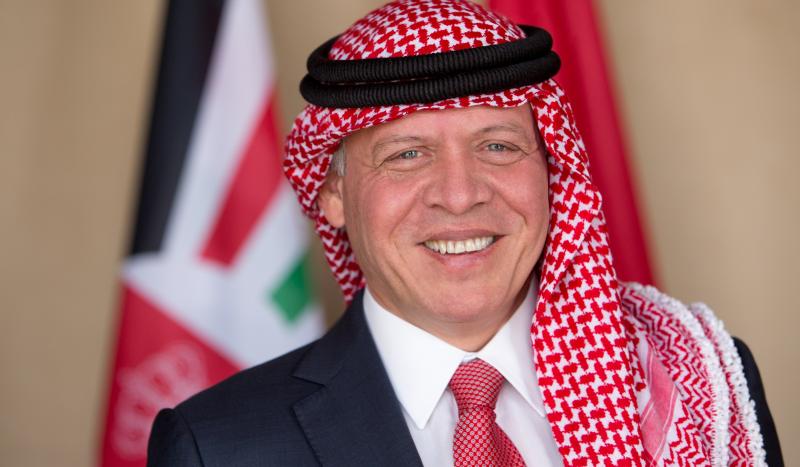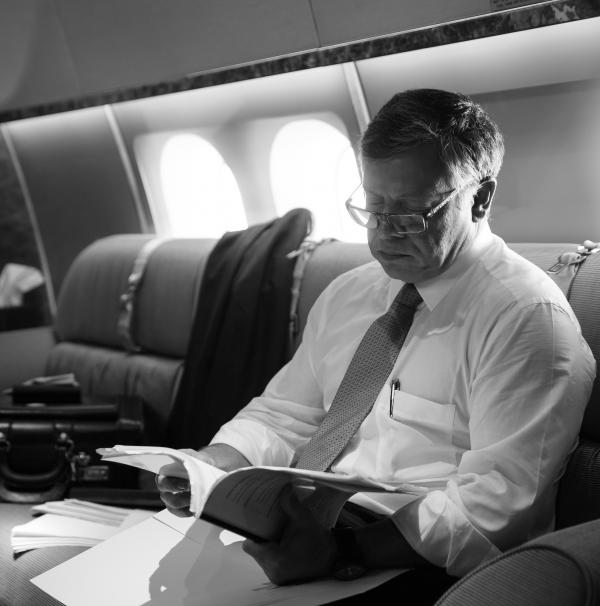King receives government action plan

His Majesty King Abdullah on Sunday received a letter from the prime minister that includes the government’s executive programme.
The letter, which is based on the Royal Letter of Designation, outlines the government’s plans and strategies to address the challenges at hand.
The premier vowed to put his government’s programme into practice and implement it according to a defined roadmap and timeframes.
On elections, he said the government has already started providing the necessary support for the Independent Elections Commission, having laid the necessary infrastructure to accomplish a transparent election of the 18th Lower House. All ministries will cooperate to encourage people to participate especially in areas where previous elections witnessed low turnout, the letter said, vowing “absolute neutrality” by all state agencies.
Regarding the decentralisation plan, ministries will prepare a general framework to implement the project and enact the necessary regulations and laws related to the process.
In the field of the rule of law, the government will coordinate with the security agencies to prevent violations against public and private property, traffic, public hygiene and environment, forestry lands, underground water, electricity lines and prices.
Regarding crimes and drug trafficking, Prime Minister Hani Mulki added, the Cabinet will support the armed forces and the security agencies’ efforts to deal with the problem and ensure social safety.
The values of integrity and transparency will be enhanced through cooperation with the Jordan Integrity and Anti-Corruption Commission, the premier said in the document.
Regarding economy, the government will focus on building investment institutions and using the available finance to encourage youths and entrepreneurs to start small and medium projects to help alleviate poverty and unemployment.
The government will also work to strengthen relations with Saudi Arabia and the Gulf countries in economic and investment fields in addition to Africa, Asia and Latin America.
Procedures and restrictions on selling and buying real estate will be revisited, he said.
The Cabinet will also pay a greater attention to the tourism sector and authorities will finalise the national tourism strategy.
The government plan also includes an assessment of the existing financing institutions that fund investment projects and drafting a law to monitor investment funds.
The Social Security Corporation will grant loans to retirees to enable them to start their own small projects through an entrepreneurship fund that is on the drawing board.
In the education field, the Education Ministry will attach more importance to preschool education and establish more kindergartens at the ministry’s schools. It will restructure the vocational education system, according to the document.
Regarding higher education, the government will implement measures towards reforming the sector through revisiting admission policies at universities and gradually cancelling the parallel education programme.
Meanwhile, the Ministry of Awqaf and Islamic Affairs will develop an approach to communicate the religious message through sermons and preaching that is in harmony with Jordan’s moderate stand, which rejects extremism. The ministry will also continue supporting the holy shrines in Jerusalem.
For its part, the Social Development Ministry will develop a social security network and will draw up a plan to redirect aid to productive projects instead of direct cash to beneficiaries. Disabled people will receive an extra attention through cooperation between the government and the Higher Council for Persons with Disability, the letter said.
The government is committed to implementing the standards of King Abdullah Award for Excellency to enhance the principle of competitiveness, Mulki stressed in the document.
The premier said that his team will commit to the Jordan Vision 2025 in partnership with the private sector to achieve the objectives of this economic blueprint.
Women participation will be enhanced in economic, social and political fields, as women empowerment is a key factor in the sustainable development.
In the energy sector, the government will work on implementing the energy strategy that seeks to diversify energy sources especially renewable energy. The contribution of renewable energy will be increased, the government will generate power from wind to reach the capacity of 600-800 megawatt in 2020 and using solar power to produce 800-1000 megawatt in the same year.
Liberalising oil prices will have its effect on developing the energy sector, the premier noted, underling the Cabinet’s support for the Atomic Energy Commission.
In the field of potable water, irrigation and sewerage system, the government is going to execute a package of measures to implement the 2016-2025 strategic plan and execute mega projects such as the Red Sea-Dead Sea Water Conveyance Project, he said.
The public transport sector will witness major projects such as building an airport in the Jordan Valley and the national railway network, in addition to finding solutions to traffic congestions.
Regarding healthcare, the letter said, the government will work on including more people under the health insurance umbrella and will improve the health services provided at hospitals and medical centres across the Kingdom.
As for combating terrorism and extremism, the Cabinet will work with concerned authorities to execute all of the measures mentioned in the national strategy for combating extremism issued in 2014.
To address issues related to youth, the government will create a new system for the Ministry of Youth in which it will restructure several departments.
The Cabinet will follow up on the Jordan Compact that was issued after the London conference regarding the world community’s pledges to help Jordan shoulder the burden of the Syrian refugees. It will also implement the projects listed in the Jordan Response Plan (JRP) cooperating with donors and UN organisations with a cost of $700 million for 2016-2018.
The government will continue investing its regional and international relations to achieve international security and contribute to solving conflicts in the region especially the Palestinian issue, which is the “core issue in the Middle East”.


